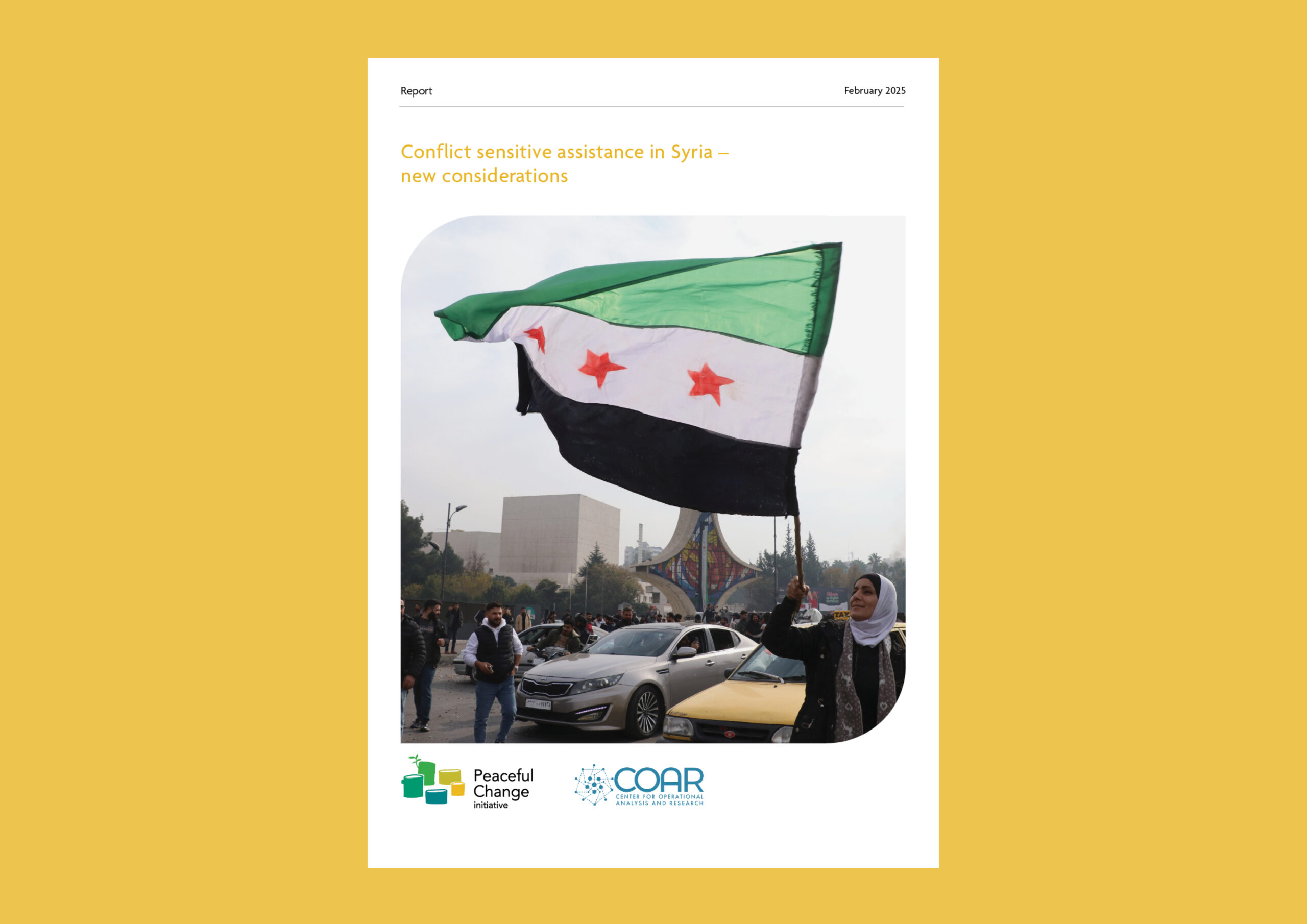Why we provide conflict sensitivity support
Humanitarian and development activities can have a significant positive or negative impact on peace and conflict dynamics. By taking a conflict sensitive approach, we can minimise the way in which these activities may fuel conflict and maximise the way they can contribute to sustainable peace.
We support international agencies, governments, and companies to navigate the challenges of working in conflict affected contexts. We focus on making conflict sensitivity simpler, more practical, and more impactful for humanitarian and development actors at all levels, from implementation to strategic planning.
What is conflict sensitivity?
Learn more about what conflict sensitivity means, and how it interacts with other ideas about responsible aid.
Our conflict sensitivity support
Our conflict sensitivity support is cost effective. Our rapid analysis tools and approaches help us understand where more in-depth analysis is most needed. This saves time and resources. In specific contexts, our Conflict Sensitivity Risk Index approach can significantly reduce costs of analysis.
Our conflict sensitivity support is clear and actionable. By focusing on the actual work of the organisations we work with; we ensure that our advice is directly related to the conflict sensitivity problems projects and programmes might face. Our Interactions Matrix Tool sets out simply and clearly where and how programming interacts with the conflict context in ways that may be harmful or positive; suggested strategies for adapting activities to mitigate potential harms or maximise peacebuilding opportunities; and how to monitor for conflict sensitivity.
Our conflict sensitivity support provides advice where and when it is most needed. We provide accompaniment and help-desk support at all stages of a project life cycle. We provide advice on how to manage specific risks that may have arisen and on how to seize specific opportunities that emerge.
Our conflict sensitivity support acknowledges that sometimes there are no risk-free ways of operating. Our Conflict Sensitive Decision-Making Tool supports organisations to make better policy, programming, and implementation choices in situations where all possible choices are problematic;
Our conflict sensitivity support builds sustainable capacity. In addition to introductory conflict sensitivity trainings, we have developed a series of role-specific trainings for finance, communications, and project implementation staff. These trainings focus on how the work of staff in different parts of an organisation is relevant for conflict sensitivity and how staff in different roles can contribute to conflict sensitivity.
How we provide conflict sensitivity support
We help improve the sustainability, efficiency and impact of humanitarian and development programming in six ways:
- Providing contextual understanding and conflict analysis of relevant locations, or relating to specific thematic issues, for partners, to inform programming.
- Conducting conflict sensitivity assessments of projects and programmes including analysis, reviewing activities, and providing advice on how implementers and donors can improve the conflict sensitivity of their work.
- Providing accompaniment and help desk support for projects to ensure conflict sensitivity is incorporated into project life cycles.
- Supporting conflict sensitivity response by working directly with implementers and donors to help them to resolve particular conflict sensitivity challenges relating to their programming work.
- Supporting the strengthening of capacity among aid actors through training and accompaniment.
- Developing new conflict sensitivity tools which can be used in different contexts and for different types of programming.
A closer look at our conflict sensitivity work
Here are some of the ways our conflict sensitivity programming is helping to increase the likelihood of sustainable peace.
Conflict Sensitive Assistance (CSA)
PCi’s Conflict Sensitive Assistance (CSA) programme in Libya, which has been running since 2012, advises international agencies, governments, and companies on how to be conflict sensitive, ensuring they are minimising the chance their activities fuel conflict dynamics and maximising their contribution to peace. As a result of analysis or advice received from the CSA Forum, organisations such as the British Embassy to Libya, and the UN have taken concrete steps to integrate conflict sensitivity into their programming. This, in turn, means these international implementers can help strengthen social peace rather than embedding grievances.
Conflict sensitive consultancy services
PCi has extensive experience providing peacebuilding and conflict sensitivity support, training and advice to a range of national and international, government and non-government organisations. We recognise the complex environments that our clients need to navigate and are adept at providing practical tools and advice. We help those we work with to not only minimise their risks of doing harm, but also to actively contribute to building peace. We provide consultancy services on a range of conflict sensitivity topics including developing peace and conflict analyses and developing context, or organisational, specific tools and resources for conflict sensitivity.
Kujenga Amani Pamoja
The Kujenga Amani Pamoja project, which translates as ‘building peace together’, works in the Swahili Coast regions of Kenya, Tanzania, and Mozambique. The project aims to support youth-led networks and organisations to actively practice and disseminate learning on peacebuilding and conflict prevention. PCi’s role within the project is to develop the project’s conflict analysis and conflict sensitivity interactions matrix and support the project team to continually monitor and adapt project activities to ensure conflict sensitivity.
Recent Publications

The Peaceful Change Podcast: the future of peacebuilding series
The Peaceful Change Podcast explores how international peacebuilding can most effectively prevent, manage, resolve and transform violent conflict.

Turkey’s approach to stabilisation: implications for the peacebuilding sector
This report examines Turkey’s increasing engagement in stabilisation and peacebuilding efforts.

Conflict sensitive assistance in Syria – new considerations
This report outlines a number of ways in which international assistance risks doing harm and ways in which it can
